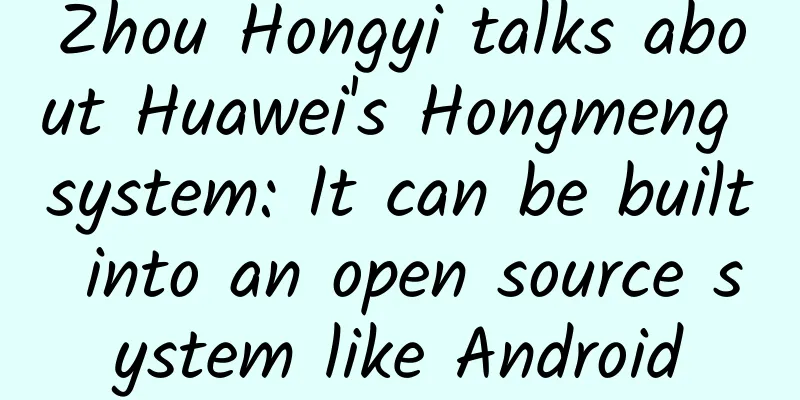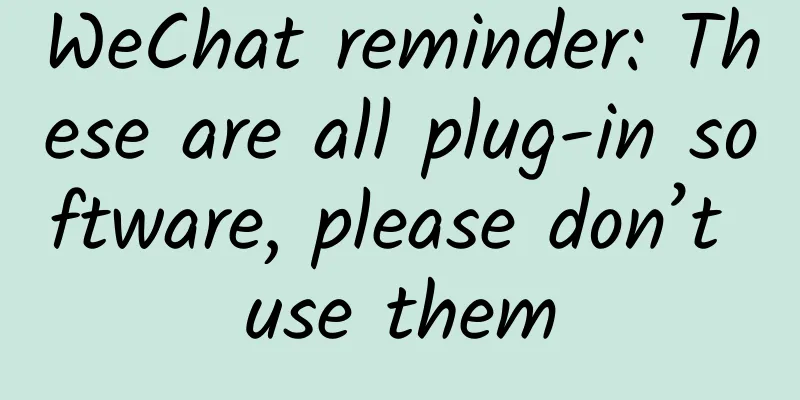Zhou Hongyi talks about Huawei's Hongmeng system: It can be built into an open source system like Android

|
On June 26, Zhou Hongyi attended the "2019 Nanjing Innovation Week" and talked about Huawei's Hongmeng operating system. He suggested that Huawei could develop the Hongmeng system in an open source way and make this operating system open source like Android, so that it would become an ecological operating system jointly built by the entire Chinese IT industry and Internet industry. In his speech, Zhou Hongyi made a new thinking on innovation based on the current international situation. He said that some countries are currently trying to decouple from China in technology, and China's technology must take the path of independent innovation. On the one hand, we must innovate independently, and on the other hand, we cannot close ourselves off. We must learn from and embrace international open collaboration methods, of which open source technology has been proven to be a good example. Zhou Hongyi further explained that in the past 30 years, major technological breakthroughs have all been made using open source mechanisms. Looking back at the operating systems of Microsoft, Apple, and Android, and even Linux, the cornerstone of the entire Internet, all use open source mechanisms and draw on the open source ecosystem. Moreover, China's innovation and development has also benefited from open source. Because of open source Android, Chinese mobile phones are sold all over the world; because of open source algorithms, China's AI has flourished. "Looking back at history, I think the open source mechanism actually provides us with a new era of collaborative innovation mechanism. The essence of open source is to connect different countries, research institutes, state-owned enterprises, and private enterprises to jointly create a great software. Therefore, open source is not just a software development method, but actually a form of economic development and an innovation mechanism," said Zhou Hongyi. At the beginning of his speech, Zhou Hongyi also talked about the ups and downs Huawei is currently experiencing internationally. He suggested that Huawei could develop Hongmeng in an open source way, and make this operating system open source like Android. This would turn it into an ecological operating system jointly built by the entire Chinese IT industry and Internet industry, which would not only solve the problem of system compatibility, but also become a truly Chinese, or even global, operating system. |
>>: It is becoming increasingly difficult to flash a mobile phone. What should Android users do?
Recommend
Artificial Intelligence Report: Scaling
Accenture has released a new report, “Artificial ...
How to analyze user thinking and do good brand marketing?
In the past, everyone has always talked about tra...
The natural "carpet" of the Qinghai-Tibet Plateau has been renewed! Scientists have discovered 11 new species of lichens
The Qinghai-Tibet Plateau has an average altitude...
What is the Himalayan tree line? What is its use?
Image source: Beijing Daily The alpine treeline, ...
Fission Methodology | Free Bait: Teach you how to swipe the screen like NetEase?
While I was busy this week, I was thinking about ...
Accelerate the future! Summary and future prospects of Autohome App application performance optimization
background As an important carrier tool for Autoh...
How much does it cost to be an agent for Puyang women's clothing mini program?
How much does it cost to be an agent of Puyang Wo...
Colored pencil drawing basic tutorial video "Colored pencils for beginners that you can learn at a glance" introductory self-study tutorial
Training course content: From zero-based entry to...
Time for the Fifth Session of the 13th National Committee of the Chinese People's Political Consultative Conference in 2022: How many days will it last? What is the closing date? Attached is the latest official news
The CPPCC held its first press conference at 3 o&...
How to use YouTube to attract traffic? Practical YouTube traffic generation tips
Written at the beginning: I believe everyone has ...
Changsha Tea Drinking and Tasting 2022 Audition Venue, Highly Recommended for You with Rich Nightlife
Changsha's 2022 tea drinking and tasting audi...
6 high-quality details of 100,000+ soft article titles
For soft articles, the first impression is the ti...
The 4 elements of event planning and event format design!
I am here again to share with you the knowledge o...
A detailed account of the 10 years of coexistence of Web technology and Native App
If the WeChat public account in the past was stil...
NIO delivered 2,526 vehicles in October, a record high in 2019, and its stock price surged 10%
On November 4, 2019, NIO released its latest car ...









